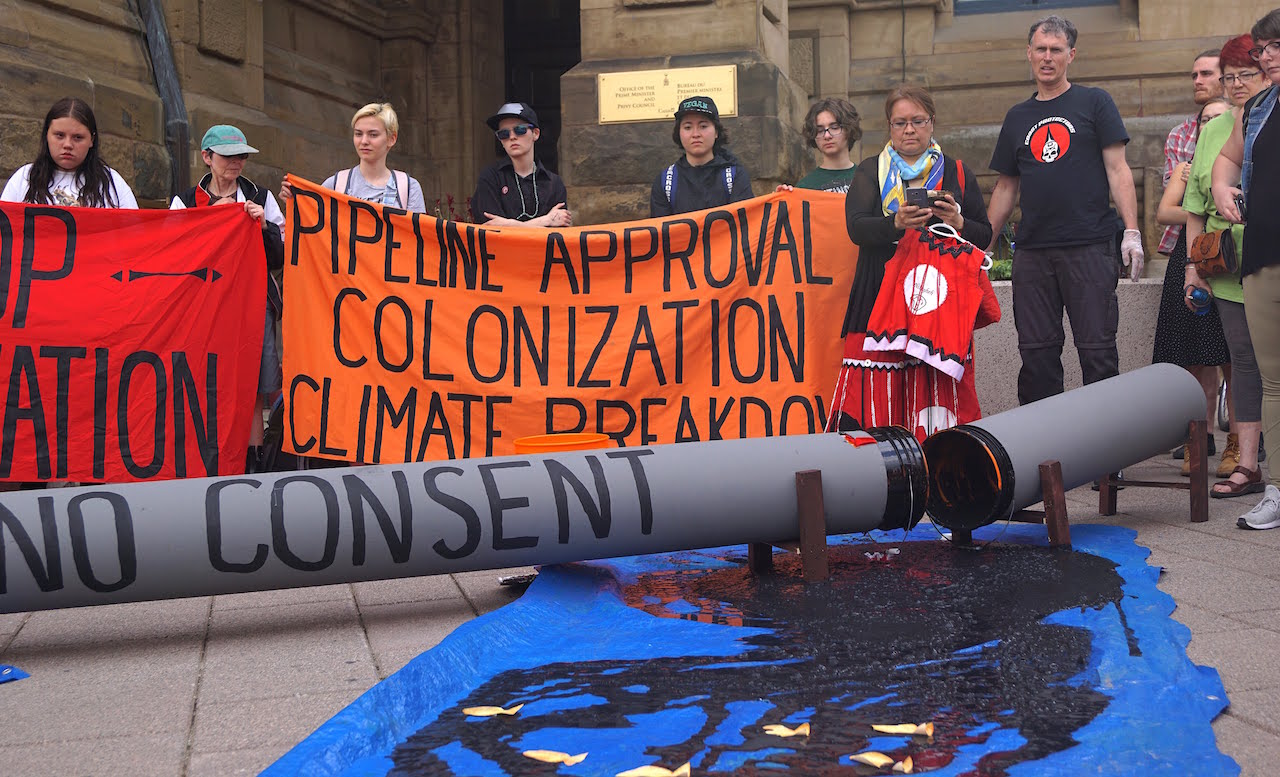In response to Prime Minister Justin Trudeau’s approval of the Trans Mountain tar sands pipeline on June 18, Extinction Rebellion Ottawa organized a “bitumen spill” the following afternoon outside his office in downtown Ottawa.
Extinction Rebellion billed the action as “taking the Trans Mountain fight to the prime minister’s doorstep.”
There are many reasons to oppose the 890,000-barrels-per-day tar sands pipeline.
It violates Indigenous sovereignty and lacks the free, prior and informed consent of numerous First Nations.
There are 133 First Nations on or near the route of the 1,150-kilometre pipeline. Almost 520 kilometres of that route would cross the Secwepemc Nation without their consent. Furthermore, only 43 First Nations have signed “mutual benefit agreements” (which should not be confused with their free, prior and informed consent for the pipeline).
The pipeline would emit massive amounts of carbon pollution.
It would produce an estimated 26 million tonnes of upstream and 60 million tonnes of downstream carbon pollution a year.
While the push is to create carbon-neutral or 100 per cent clean energy economies by 2025, the Trans Mountain pipeline, with arguably a lifespan over 50 years, could still be churning out millions of tonnes of carbon pollution beyond 2070.
It would put at risk the Salish Sea and whales.
The pipeline would load about 400 export tankers a year that would depart from the traditional territory of the Tsleil-Waututh Nation (without their consent) and further endanger the 76 orcas in the Salish Sea which are already on the brink of extinction.
It is a huge waste of money.
Apart from the $4.5 billion the Trudeau government spent to buy the existing infrastructure, the pipeline could cost another $15 billion to build. That’s $20 billion that would be much better spent on the public interest, including building renewable energy infrastructure and creating well-paying jobs in a sustainable energy economy.
And it would put at risk the 1,300 waterways and 1,150 kilometres of territory (the communities, land, medicines, water and wildlife) that it crosses.
To convey this danger at the Extinction Rebellion action, activists cut blue tarp into wide strips representing two main rivers the pipeline would cross: the Fraser River and the Thompson River.
Spills are part of the international Extinction Rebellion toolkit.
Extinction Rebellion has staged disruptive spills of “blood” (made from food colouring and corn starch) in London (200 litres poured at 10 Downing Street, the British prime minister’s residence) and Paris (300 litres at the Trocadéro, a tourist landmark) to represent the loss of life connected to climate breakdown.
Extinction Rebellion Ottawa spilled a more modest 80 litres of “bitumen” at its action outside the prime minister’s office.
That bitumen was made through a process of boiling water in a large pot, mixing corn starch and cold water in a mason jar, then adding that mixture into the boiling water along with water-soluble black satin acrylic paint.
After the bitumen spilled onto blue tarp “waterways,” we added two pails of water to represent the flow of the river widening the bitumen spill.
To add an audio element to the bitumen spill, a YouTube video of a Second World War-era air raid siren was recorded onto a voice recorder and patched into a portable, battery-powered 50-watt sound system via an auxiliary (aux) cord.
Afterwards, the bitumen was cleaned up. Though there was some debate about whether this should be done or not, the message was clear. A pretend non-toxic bitumen spill can be easily and quickly cleaned up — the same cannot be said about a real bitumen spill.
To give context to Extinction Rebellion’s opposition to Trudeau’s approval of the pipeline, Indigenous voices of resistance were central to the protest and conveyed in different ways.
Secwepemc land defender and water protector Kanahus Manuel joined via a cellphone patched into the sound system via the aux cord.
Rueben George from the Tsleil-Waututh Nation was able to join via an audio recording of a media conference he had spoken at in Vancouver the previous evening. Again, an aux cord connected the handheld voice recorder into the sound system.
And Jocelyn Wabano-Iahtail, an Ininew Eeyou Eskwayow activist from the Cree community of Attawapiskat who lives in Ottawa, was able to join in person.
There was also singing by local musician-activist Arif Jinha as well as the Honour Song by Mi’kmaq grandmother Darlene Gilbert who was arrested in April on a contempt charge for protecting the Shubenacadie River on unceded territory in Nova Scotia from the damage that would be inflicted by the Alton Gas project.
While the police kept a distance from this Extinction Rebellion spill, that hasn’t always been the case with other spills.
In June 2016, six people were arrested for dumping grey liquid representing mercury in front of the steps to the Ontario legislature in Toronto.
The protest drew attention to decades of government inaction after a pulp and paper mill deliberately dumped 10 tonnes of mercury into the English-Wabigoon River system on the territory of the Grassy Narrows First Nation in northern Ontario.
Firefighters arrived at Queen’s Park (at a speed not seen at Grassy Narrows) even though it was made clear that the “mercury” was made from cornstarch, water and soluble paint.
In order to stop the Trans Mountain pipeline, other destructive major resource extraction projects, and climate breakdown, continuous and escalating disruptive actions will be needed –including bitumen spills, intersection blockades, and more.
If the construction itself begins, a further set of tactics will be needed to block the construction equipment to ensure that the pipeline is never completed.
Brent Patterson is an activist-blogger who writes this monthly column on inspiring stories of global resistance to neoliberalism and climate change.
Photo by Koozma J. Tarasoff




